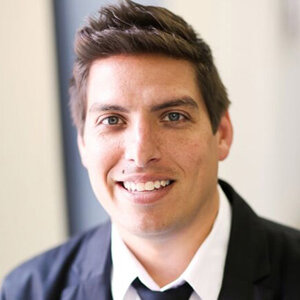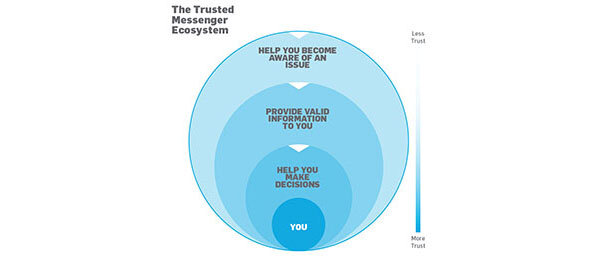Today’s most trusted messengers: How nonprofits and causes can effectively move people from awareness to action

Who should causes and brands leverage as messengers to help generate awareness, increase knowledge, and inspire action to address today’s most pressing issues?
In 2021, I helped lead a study for the Ad Council Research Institute (ACRI) to determine just that: When it comes to the most important—and often divisive—issues today, who do Americans turn to for honest, unbiased information to help guide decision making?
This year’s study again sought to determine today’s most trusted messengers, in general and for six key issues: voting/democracy, health/wellness, mental health, racial equity and justice, climate change, and addiction. When looking at these and other issues, it’s important to understand how those messengers shift as a person goes through the Trusted Messenger Ecosystem—the journey of awareness to information gathering to remaining informed or taking further action.
Here is what we discovered about how messengers can help change attitudes and behaviors in social issue campaigns:
1. Messengers with broader reach are critical in generating awareness of an issue. Beyond close friends and their spouse/partner, Americans tend to become aware of issues from individuals with broad reach (and that they may not personally know): news anchors or commentators, social media friends, government officials or politicians, journalists, and social media influencers and celebrities. These broad and often well-known individuals have the audience and the tools to reach a large number of people and generate that initial awareness.
Some variances could be seen by demographic categories. Younger generations are more likely than older ones to become aware of issues via social media influencers, celebrities, and podcast hosts, whereas boomers are more likely to hear about issues from politicians or government representatives. Black, Hispanic/Latinx, and Asian Americans are more likely than white Americans to become aware of issues from social media and celebrities, while mixed-race respondents were more likely to cite nonprofit organizations and religious communities.
2. As they start to gather more information, people look to family and friends, credentialed experts, or local leaders for guidance and deeper understanding. Once they’ve been made aware of an issue and begin to move through the Trusted Messenger Ecosystem from awareness to understanding, Americans start to look to those close to them, like friends and family. They also turn to experts and local leaders such as doctors and medical professionals, scientists, professors, teachers, and religious leaders. At this stage, our research found that some Americans showed high levels of distrust for social media influencers, celebrities, and athletes.
Here again, we see generational differences. Boomers are especially trusting of family, while younger generations are more trusting of messengers like celebrities, content creators, etc. White Americans are more trusting of family and experts, whereas Black Americans are more trusting of messengers like church leaders and members, teachers, celebrities, and social media friends and influencers.
3. Some key trusted messengers differ by issue. The top trusted messengers overall and by the six key issues we looked at are the same across the board: friends, family, and spouse or partner. After that, however, there are key messengers nonprofits and cause organizations can leverage to generate awareness and help inform.
For example, on issues of voting and democracy, Americans turn to news messengers such as anchors, journalists, and commentators and government representatives or politicians for information. On health and wellness, mental health, and addiction, they often seek out information from experts like doctors, scientists and professors. Scientists are also trusted on issues related to climate change. And nonprofit organizations are considered trusted messengers for topics like racial equity and justice, mental health, and addiction.
Given these variances, when executing social issue campaigns, causes and brands should be careful to feature messenger(s) that the target demographic trusts most at each stage of the knowledge journey for the specific issue area.
1. Know your audience.
It may be a concept from Marketing 101, but truly understanding your audience makeup is key to effectively generating and growing awareness of your issue. For example:
- Trust in scientists, professionals, and academics is very low among Republicans. Democrats regularly turn to professionals for information (doctors, scientists, professors, teachers). Republicans are much less likely to trust these experts and instead are more likely to trust their pastors or other religious leaders.
- Americans living in urban areas are much more trusting than those in rural areas. This is especially salient with regard to trust of doctors and medical professionals, scientists, professors and other academic experts, and teachers as messengers. The only messengers with similar levels of trust between urban and rural Americans are pastors and other religious leaders.
Younger generations are more likely to trust social media influencers and celebrities. As noted above, younger Americans are more likely to trust messengers like social media influencers, celebrities, and podcast hosts, while boomers are more likely to seek out information from politicians or their religious community. Other notable key differences among generations can be found in the 2022 Trusted Messengers Study.
2. Plan messengers for each stage of the Trusted Messenger Ecosystem.
Trusted messengers differ depending on where a person is in their knowledge journey. At the outset of the campaign, organizations should plan these messengers strategically for each stage—individuals with broader reach to generate awareness, more local and/or credentialed experts to support information gathering, local communities or friends and family for decision making. For example, a celebrity may be crucial in generating broad awareness and urgency around the importance of getting a flu shot, but doctors and pharmacists (or even one’s friends and family) will help drive appointment sign-ups.
Though U.S. society seems deeply divided today, Americans tend to be more similar in the messengers they listen to and trust than they are different. By strategically identifying, preparing, and leveraging the right trusted messengers across each phase of the Trusted Messenger Ecosystem, causes and brands can successfully generate awareness, shift attitudes, and drive desired behaviors for the social issues on which they work.
Derrick Feldmann (@derrickfeldmann) is the founder of the Millennial Impact Project, lead researcher at Cause & Social Influence, and the author of The Corporate Social Mind. See Derrick’s related articles in Philanthropy News Digest, “Nurturing a community for the greatest impact” and “Creating symbiosis between marketing and advocacy.” He also is managing director, Ad Council Research Institute and the Ad Council Edge Strategic Consultancy.






